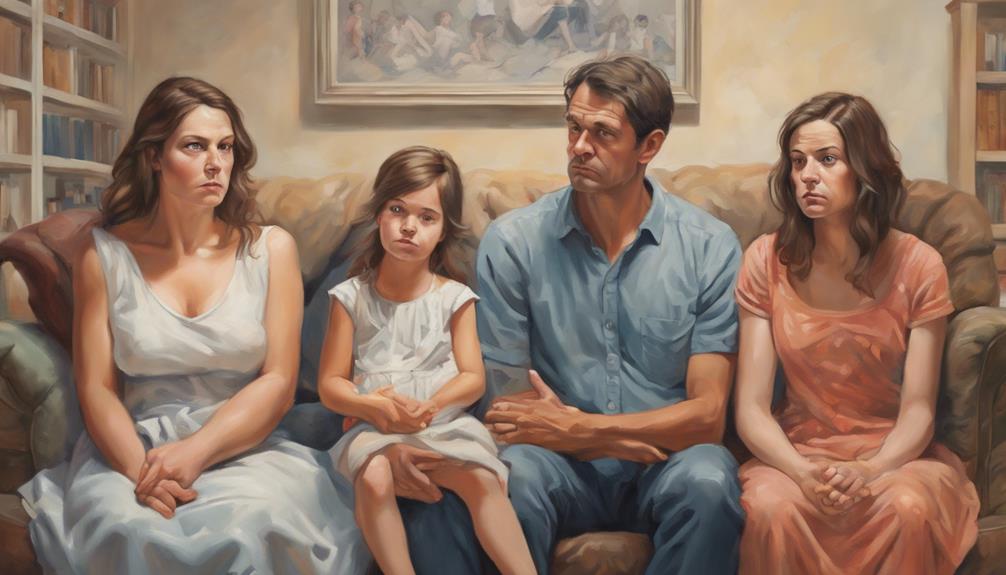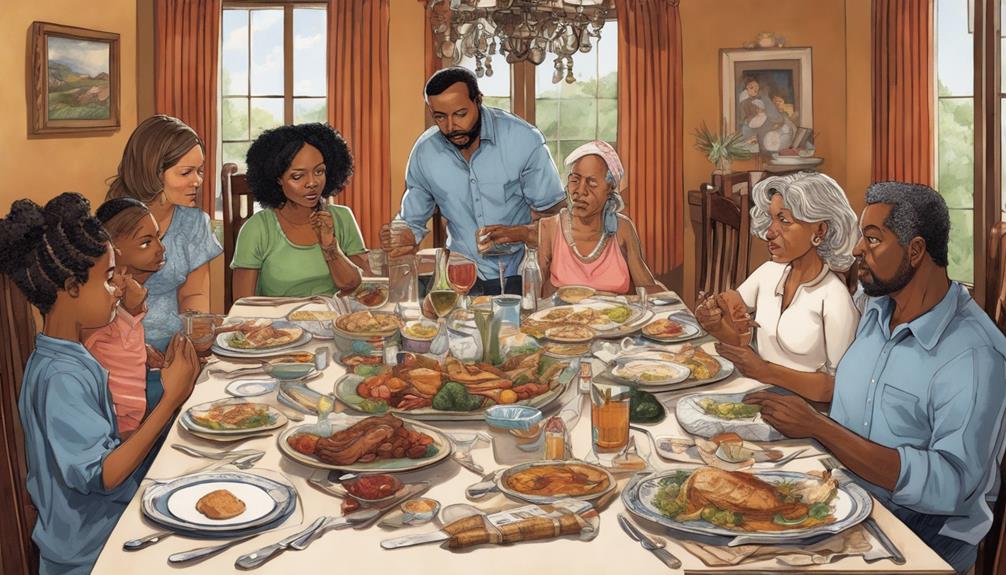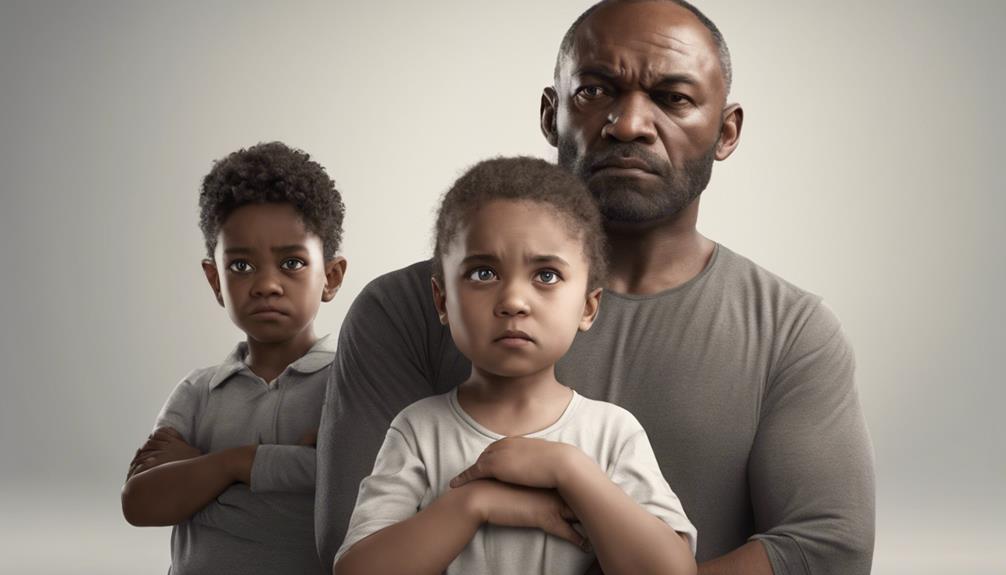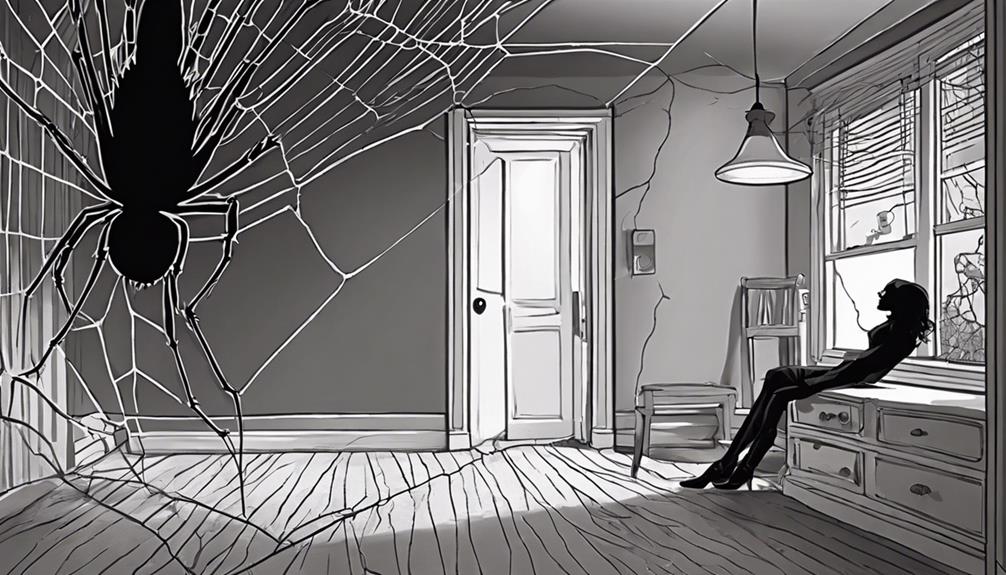Have you ever wondered why some parents seem to harbor negative attitudes towards those who choose to remain childfree? It's a question that often sparks curiosity and contemplation.
The dynamics between parents and the childfree can sometimes be complex, influenced by a variety of factors that go beyond mere personal preferences.
Let's explore the underlying reasons behind this phenomenon and uncover what lies beneath the surface of these interactions.
Key Takeaways
- Societal norms and expectations pressure parents to conform, leading to hostility towards childfree individuals.
- Fear and misunderstanding of childfree choice drive parental criticism and judgment.
- Lack of exposure to diverse lifestyles fuels insecurities, making childfree individuals appear threatening.
- Cultural and family influences contribute to tensions, highlighting the importance of empathy and understanding in diverse perspectives.
Societal Norms and Expectations
Breaking away from societal norms can be challenging, especially when it comes to the decision to be childfree. Society often expects individuals to follow traditional family roles, including parenthood, and those who choose to deviate from these norms may face criticism and judgment. The pressure to conform to societal expectations of reproduction can lead to animosity towards those who challenge these norms.
Women, in particular, face stigma for choosing to be childfree, as they're often expected to fulfill caregiving roles within a family. This perpetuates the misconception that a woman's worth is tied to her role as a mother. The societal pressure to have children can create a hostile environment for those who opt out of parenthood, with childfree individuals being viewed as selfish or irresponsible for not adhering to the perceived social obligation of having children.
Breaking free from these societal expectations requires courage and resilience in the face of judgment and misunderstanding.
Misunderstanding of Childfree Choice

In some cases, parents may misinterpret the childfree choice as a rejection of parenthood rather than a personal decision. This misunderstanding can stem from misconceptions about the childfree lifestyle and the reasons behind choosing it. Parents, influenced by societal norms that prioritize traditional family structures, may struggle to comprehend the childfree choice, leading to judgment and criticism towards those who opt out of parenthood.
It's crucial to address these misconceptions and lack of awareness surrounding the childfree community. Education and open dialogue play vital roles in bridging the gap between parents and individuals who've chosen a childfree lifestyle. By fostering understanding and respect for different life paths, we can create a more inclusive and supportive environment for all choices regarding parenthood. It's essential to recognize that opting to be childfree is a personal decision, not a condemnation of parenthood, and promote empathy and acceptance among parents and the childfree community.
Fear of Different Lifestyles
Some parents struggle to accept the childfree lifestyle because it challenges their beliefs and societal norms. They may fear what they don't understand and feel threatened by choices that differ from their own.
This fear of different lifestyles can lead to judgment and misconceptions about personal freedom and individual decisions.
Judgment of Choices
Unfamiliarity with alternative lifestyles often fuels parental hostility towards those who choose not to have children. This judgment of childfree individuals can stem from a deep-rooted adherence to traditional norms and societal expectations. Here are four insights into why this judgment occurs:
- Lack of Exposure: Limited exposure to diverse lifestyles can lead parents to judge childfree individuals based on their own preconceived notions.
- Fear of the Unknown: Parents may fear what they don't understand, causing them to pass judgment on those who make different choices.
- Social Pressure: Societal expectations around family planning can create pressure on parents to conform, leading to criticism of those who deviate from the norm.
- Personal Insecurities: In some cases, parental judgment of the childfree may reflect their own insecurities about their choices and lifestyles.
Misunderstanding Personal Freedom
Understanding personal freedom can be hindered by a fear of different lifestyles and a lack of exposure to diverse choices. Societal norms often dictate what's considered acceptable, leading to a lack of understanding and empathy towards those who deviate from traditional paths.
The fear of different lifestyles can stem from a discomfort with challenging the status quo and a reluctance to accept alternative ways of living. This fear can manifest as judgment and hostility towards the childfree, as their choice challenges the conventional notion of fulfillment through parenthood.
Judgement and Criticism

Judging childfree individuals for their decision not to have children reflects societal biases towards parenthood. When criticism and judgment are directed at those who choose not to have kids, it often stems from deep-rooted societal norms that prioritize parenthood as the ultimate path to fulfillment.
Here are four reasons why judgment and criticism towards the childfree are prevalent:
- Cultural Expectations: Society often expects individuals to follow a predetermined life script that includes marriage and children. Deviating from this norm can lead to scrutiny and criticism.
- Perceived Selfishness: Some individuals view choosing not to have children as a selfish act, believing that people should prioritize family and children above all else.
- Lack of Understanding: Misconceptions and stereotypes about childfree lifestyles can lead to unwarranted hate and criticism from parents who adhere to traditional family values.
- Parental Priorities: Parents who prioritize traditional family structures may struggle to comprehend or accept alternative choices, leading to judgment towards the childfree.
Personal Insecurities and Regrets

Parents projecting their personal insecurities and regrets onto childfree individuals can lead to criticism and hostility towards those who have chosen not to have children. The decision to be childfree may trigger feelings of defensiveness and judgment in parents who question their own choices or feel pressured by societal norms. Some parents harbor regrets about having children, and they may express negativity towards the childfree as a way to cope with their internal struggles. Insecurities about parenting abilities or the challenges of raising children can contribute to parents criticizing those who opt not to have children. There is sometimes a fear of missing out on the freedom and opportunities enjoyed by childfree individuals, leading to resentment and hostility.
| Personal Insecurities | Regrets | Societal Norms |
|---|---|---|
| Feeling inadequate as a parent | Remorse about having children | Pressure to conform to traditional family structures |
Perceived Threat to Parenthood

The perception of childfree individuals as a threat to traditional family values can provoke defensive reactions from some parents. This reaction is often rooted in a deep-seated fear of the unknown and a sense of insecurity about their own choices regarding parenthood.
Here are some reasons why parents may feel threatened by the childfree:
- Challenging Norms: The decision to be childfree challenges the traditional societal norms surrounding family and parenting, causing some parents to feel their way of life is being questioned.
- Projection of Insecurities: Parents who are unsure or regretful about their decision to have children may project these feelings onto those who've opted out of parenthood.
- Fear of Criticism: The fear of judgment from the childfree community can lead some parents to lash out defensively, fearing that their choices are being judged or invalidated.
- Misunderstandings: Misconceptions about the childfree lifestyle can contribute to a lack of understanding and empathy, fostering resentment or hostility towards childfree individuals.
Pressure to Conform

Feeling the societal pressure to conform to traditional expectations of parenthood can lead to animosity towards those who choose to be childfree. Society often portrays parenthood as the norm, placing non-parents in the firing line for criticism and judgment. This pressure to fit into the mold of a typical family unit can breed resentment towards individuals who deviate from this path by opting out of having children.
Insecurities or doubts about their own decision to have children may prompt some parents to project these feelings onto those living a childfree lifestyle. Seeking validation for their choices, some parents may exhibit hostility towards those who've made different decisions regarding parenthood. The need for affirmation in their own life choices can sometimes manifest as negative attitudes towards those who've chosen not to have children.
This pressure to conform to societal expectations can create a tense environment where those who choose to be childfree feel judged and misunderstood.
Cultural and Family Influence

Navigating societal norms and family expectations can significantly influence how individuals perceive those who choose to live a childfree lifestyle.
- Family Pressure: Parents may feel pressured by family members to conform to traditional expectations of parenthood, leading them to project this pressure onto childfree individuals.
- Cultural Norms: Cultural ideals often place a strong emphasis on family, lineage, and continuity, making it challenging for parents to understand or accept the decision of others to remain childfree.
- Societal Expectations: Society at large tends to uphold the value of parenthood, causing parents to fear judgment or criticism if their children choose not to have kids.
- Interpersonal Dynamics: Within families, the decision to be childfree can be perceived as a rejection of family values, potentially causing parents to experience feelings of loss or disappointment.
These influences can create tension between parents and childfree individuals, as differing perspectives on family, culture, and societal norms clash, leading to misunderstandings and conflict.
Lack of Empathy and Understanding

We notice a significant empathy gap in parenting where some struggle to grasp the childfree choice. This misunderstanding often results in criticism and strained relationships between parents and the childfree.
Bridging this gap requires fostering empathy and respectful communication to promote mutual understanding.
Empathy Gap in Parenting
In the realm of parenting, an evident gap in empathy towards childfree individuals persists.
Parents often struggle to understand the decision to remain childfree, as societal norms heavily emphasize the importance of parenthood.
Differences in life experiences, values, and beliefs can create a barrier to empathy between parents and those who choose not to have children.
Misconceptions and judgment towards childfree individuals can further widen the empathy gap, leading to strained relationships.
Bridging this gap requires open communication, respect, and a willingness to understand each other's perspectives.
Understanding the diverse choices people make regarding parenthood is vital for fostering empathy and creating harmonious relationships between parents and the childfree.
Misunderstanding Childfree Choice
The lack of empathy and understanding towards the childfree choice often fuels animosity and misunderstanding between parents and those who opt not to have children. Misconceptions and stereotypes about childfree individuals can perpetuate this lack of empathy, leading to judgment and criticism. Many parents fail to grasp the diverse reasons and personal considerations behind the decision to remain childfree, contributing to the rift between the two groups. Empathy is crucial in bridging this gap, as it allows for a deeper understanding of different life paths and priorities. By fostering empathy and dispelling misconceptions, we can move towards a more inclusive and respectful dialogue surrounding the choice to be childfree.
| Misconceptions | Stereotypes | Empathy |
|---|---|---|
| Lack of understanding of reasons | Assumptions about selfishness | Understanding different priorities |
| Belief that it's a rejection of parenthood | Labeling as immature | Acknowledging diverse life paths |
| Viewing childfree as irresponsible | Linking it to career focus | Compassion for individual choices |
| Ignoring personal considerations | Associating it with loneliness | Recognizing autonomy and agency |
| Failure to respect diverse choices | Assuming it's a passing phase | Cultivating open-mindedness |
Identity Threat and Validation

Experiencing identity threat and seeking validation, some parents may react defensively towards those living a childfree lifestyle. This reaction stems from societal pressures that glorify parenthood as the ultimate fulfillment, leaving those who choose not to have children feeling like outsiders. Here are four key points to consider:
- Challenging Traditional Norms: The decision to be childfree challenges long-standing societal norms, causing discomfort for parents who've embraced these traditional expectations.
- Feelings of Inadequacy: Some parents may interpret the childfree choice as a personal rejection of parenthood, leading to feelings of inadequacy and questioning their own life decisions.
- Validation and Judgment: Parents seeking validation for their sacrifices may perceive the childfree as judgmental or dismissive, further exacerbating their defensive reactions.
- Self-Identity Struggles: Identity threat from the childfree lifestyle can trigger defensive responses in parents struggling to find purpose and meaning outside of traditional parental roles.
Beliefs About Fulfillment and Legacy

Some of us hold tight to the belief that true fulfillment in life stems from raising children, shaping the narrative that parenthood is the cornerstone of leaving a lasting legacy. These convictions can lead us to view those who choose not to have children through a lens of selfishness, deviating from the expected path of passing down our heritage.
Misconceptions about how one's impact on the world is solely validated through parenthood can cultivate judgment and animosity towards individuals who opt out of traditional family structures.
Legacy Beliefs Impact
Understanding legacy beliefs and their impact on attitudes towards the childfree lifestyle is crucial in comprehending the complexities of societal expectations around parenthood.
- Legacy Beliefs Influence Perception: Traditional views emphasizing generational continuity can lead to criticism of those opting out of parenthood.
- Personal Success Measurement: Parents valuing legacy may struggle to accept the childfree choice as valid, viewing parenthood as essential for fulfillment.
- Societal Pressure Conformity: The pressure to meet societal expectations around parenthood for legacy and family continuity can breed negativity towards the childfree.
- Impact on Judgment: Beliefs highlighting the importance of leaving a lasting legacy through offspring can fuel resentment towards those not pursuing parenthood.
Fulfillment Perspectives Vary
Navigating differing beliefs about fulfillment and legacy can lead to tensions between parents and the childfree community. Some people who are parents believe that true fulfillment and leaving a lasting legacy come from having children. This viewpoint, shaped by societal norms, can create a sense of superiority and judgment towards those who choose not to have kids.
On the other hand, the childfree community often values personal fulfillment through pursuits other than parenthood and questions the traditional notion that having children is the only path to leaving a legacy. These contrasting perspectives highlight the need for open dialogue and understanding between both groups to create a safe space where beliefs about fulfillment are respected, and social justice is upheld. Despite this, individuals in the childfree community may still experience societal pressure or judgment, leading to feelings of alienation or misunderstandings about their choices. Combating childfree discrimination requires challenging cultural norms that equate fulfillment solely with parenthood and fostering an environment in which diverse life choices are equally valued. By promoting empathy and recognizing the validity of different paths to happiness, society can move toward greater inclusivity and mutual respect.
Emotional Responses and Defensiveness

In exploring emotional responses and defensiveness towards the childfree, one can observe how societal expectations shape parental reactions.
- Personal Insecurities: Parents may feel insecure about their own choices when confronted with childfree individuals, leading to defensive reactions.
- Fear of Judgment: The fear of being judged for their decision to have children can trigger defensive responses towards those who've chosen not to.
- Validation of Choices: Some parents may seek validation for their decision to have children by invalidating the choices of the childfree, leading to emotional reactions.
- Societal Norms: Deep-rooted societal norms that equate parenthood with fulfillment can fuel defensiveness towards those who challenge this belief.
These emotional responses and defensiveness often stem from a complex interplay of personal values, societal pressures, and individual choices. Understanding these dynamics can help foster empathy and mutual respect between individuals with differing views on parenthood.
Frequently Asked Questions
What Is the Regret Rate for Childfree People?
We've got some interesting stats on the regret rate for childfree folks. Studies show only about 6% of childfree individuals express regret over their decision. This rate is much lower than that of parents, pointing to a strong sense of contentment among the childfree.
Factors like personal values, lifestyle choices, and career goals play a big role in this high satisfaction level.
It's clear that many childfree individuals are happy with their choice.
Do Childless People Regret Not Having Kids?
We don't regret our choice to remain childless. Our lives are filled with personal growth, career achievements, and freedom. It's a decision that brings us contentment and joy.
Society's expectations may try to sway us, but we stand firm in our happiness. Parenthood isn't for everyone, and we've found fulfillment in our childfree lifestyle.
What Is the Disadvantage of Being Childfree?
Being childfree can lead to feelings of isolation and exclusion as societal norms often revolve around parenthood. It may result in strained relationships with family and friends who prioritize having kids.
Finding support tailored to our unique needs can be challenging. Despite these hurdles, we embrace our choice and seek understanding from those around us.
How Do I Cope With Not Seeing My Son?
It's tough not seeing our son, but we find ways to cope. We stay connected through calls and video chats, plan visits when we can, and use technology for virtual activities.
Expressing our feelings openly helps too. Seeking support from loved ones or a therapist is crucial for dealing with the emotions. It's all about finding ways to maintain that bond and create lasting memories despite the distance.
Conclusion
In conclusion, it's important to recognize that societal norms can create tension between parents and the childfree. Interestingly, a recent study found that 1 in 5 childfree individuals reported feeling judged by parents for their decision.
By fostering empathy and understanding, we can work towards building a more inclusive and accepting society where all choices are respected. Let's strive to break down barriers and support each other in our diverse paths to fulfillment.









